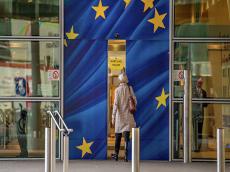|
|
TODAY.AZ / World news
EU wants to create its own army
14 September 2016 [16:36] - TODAY.AZ

By Azernews
By Gunay Hasanova
As was expected, the UK's decision to leave the European Union turned out quite strong argument to impact further developments within the union of 28 countries of the Old Continent.
Brussels is giving signals to creating a new military bloc to ensure its internal and external security.
"Now the member states are in discussions in Brussels on the establishment of a European army, which will be tasked with providing external and internal security of the EU," wrote NEWS, citing a source in the publication of the European Commission, RIA Novosti reports.
In case the initiatives are approved, the united European military bloc can be created in 2018.
The military of the European Union involves various cooperative structures that have been established between the armed forces of the member states, based on both intergovernmental and institutional frameworks.
Until recently the main opponent of the development of a European Defense policy was the United Kingdom. The possible rivalry with NATO was bothering London.
As a result of the referendum vote to decide whether the UK should leave or remain in the European Union held on June 23, 2016, “leave” won by 52 percent to 48 percent. The referendum turnout was 71.8 percent, with more than 30 million people voting.
Earlier, European Commission President Jean-Claude Juncker said that the European Union is not at best shape.
Hence, the further impact of Brexit on the EU is also expected to be significant.
The export, supply chain, investment and policy interests of many large corporations would be adversely affected, but perhaps the single biggest impact will be on the cost of raising finance in Europe which is likely to increase.
In turn, Brexit would have a wider political impact on the EU, both by disrupting internal political dynamics and because of the risk of political contagion if the case of leaving the EU encourages disintegrative forces in other member states.
Consequently, member states would also be affected in different ways and to different extents both politically and economically.
The European Union is an economic and political partnership involving 28 European countries, which after the Second World War fostered economic co-operation, with the idea that countries which trade together are more likely to avoid going to war with each other.
It has since grown to become a "single market" allowing goods and people to move around, basically as if the member states were one country.
URL: http://www.today.az/news/regions/154181.html
 Print version
Print version
Connect with us. Get latest news and updates.
See Also
- 24 November 2025 [09:00]
Senior Israeli officers removed from service for role in Oct. 7 security collapse - 23 November 2025 [22:24]
Face-covering headgear banned in Manila's streets - 23 November 2025 [21:38]
Dozens of children escape gunmen after 315 Abducted in Nigeria - 23 November 2025 [21:16]
US President claims he is underappreciated, says Ukraine lacks gratitude - 23 November 2025 [20:47]
Israeli strike hits Beirut, aiming at Hezbollah chief of staff - 23 November 2025 [20:19]
US boycotts G20 Summit in South Africa, leaving presidency handover in limbo - 23 November 2025 [19:20]
Malaysia plans social media ban for under-16s from next year - 23 November 2025 [18:37]
President Erdogan plans to meet his Russian counterpart to discuss Ukraine - 23 November 2025 [17:16]
Kyiv launches deep strike inside Russia, hits Shatura Heat and Power Plant - 23 November 2025 [14:31]
Ninety arrested at London rally backing banned Palestine Action group
Most Popular
 British parliament hosts landmark launch of the Eurasia Policy Council
British parliament hosts landmark launch of the Eurasia Policy Council
 Azerbaijan brings together NGOs of Turkic States for first time
Azerbaijan brings together NGOs of Turkic States for first time
 OpenAI launches ChatGPT group chats worldwide
OpenAI launches ChatGPT group chats worldwide
 Tirana hosts major Azerbaijani carpet exhibition marking UNESCO anniversary
Tirana hosts major Azerbaijani carpet exhibition marking UNESCO anniversary
 Mugham concert captivates audience in Baku
Mugham concert captivates audience in Baku
 Uber launches robot deliveries in UK
Uber launches robot deliveries in UK
 WhatsApp introduces new feature
WhatsApp introduces new feature
